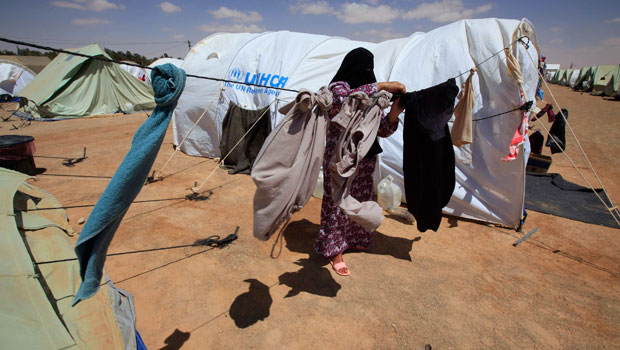Libyan leader Muammar Qaddafi has previously warned European leaders backing the revolt against his 41-year rule that he would unleash a wave of migrants against Europe to retaliate against military strikes on his country.
The arrival of large numbers of migrants fleeing Libya has already caused strains among European Union nations, with Italy, where most have arrived, saying it should not have to bear the whole burden.
“There are elements to make us think that at least some of the actors involved in what’s happening today in western parts of Libya may be attempting to use this weapon of forcing people to move into Europe,” Antonio Guterres, the UN High Comissioner for Refugees, told a conference in Paris.
The war has caused misery for tens of thousands forced to flee overland or by boat, with hundreds of immigrants from north Africa feared to have died attempting to reach Italian shores.
The International Organization for Migration has said more than 10,000 had arrived on Italian islands since unrest erupted in northern Africa earlier this year, including roughly 2,000 last weekend alone.
Migrants said they had been forced onto boats by Libyan soldiers who fired warning shots. Others said that although they had not officially had to pay for their crossing, they had been stripped of their possessions and savings.
“One thing is clear. You have a number of people that is totally inadequate for the (size of) boats and whoever is organizing the movement must know that there is an enormous risk to these boats sinking,” Guterres, a former Portuguese prime minister, said. “The second thing is that some people who arrived are saying they were forced to remain on the boats.” Aid agencies say witnesses have reported a vessel carrying 500-600 people sank last week near Tripoli. Before that, an estimated 800 people had gone missing from March 25 onwards after trying to escape from Libya, according to the UNHCR.
Guterres said about 750,000 people, mainly migrant workers, had fled Libya since February. About 50,000 Libyans had escaped into Tunisia, but one of the biggest issues was resettling about 3,000 Eritreans and Somalis, who had already fled their countries, and were stuck at the Tunisian and Egyptian borders.
“We have launched an appeal for a solidarity settlement program for these people and the answer has been mediocre. We are hoping for something more proactive from the developed world,” he said.
France and other EU states want to keep migrants fleeing turmoil in North Africa from spreading through the EU, creating divisions in the bloc over how to tackle the issue.
Fuelling a row over the matter is the demand by Italy that other EU governments should help it to cope with thousands of migrants who have arrived on its shores this year.
“(The debate) reveals a reaction that is out of proportion... we are talking about 30,000 people, which (is) compared to 1.7 million refugees in Pakistan,” he said.










